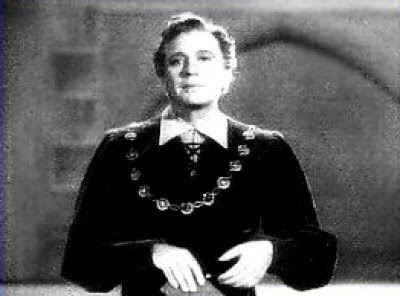
In 1975 when BBC producer Cedric Messina was working on a drama at Glamis Castle, he decided that it would be the perfect location for a production of Shakespeare’s As You Like It. Thinking about it some more, he wondered why he should stop there? Why not film all of the plays in the canon (thirty-seven at that point, Two Noble Kinsmen and Edward III not having been admitted yet), some jolly good Shakespeare, for broadcast on television? The BBC liked that idea. And eventually so did the American co-producers, oilmen and bankers (the likes of Exxon and Morgan Bank who wanted to be seen to be very interested in culture). A big event, an epic undertaking, televising the canon was a chance for the BBC to thump it’s chest and shout “This is what we do!” (with a little help from some friends).
As Susan Willis explains in The BBC Shakespeare Plays: Making The Televised Canon, a celebration of Messina's undertaking, the Americans having stipulated that it shouldn’t be too radical, so none of that modern dress malarkey, the producer would see his original vision be revised and revised, and ultimately completed six years later, having gone through three producers with three different visions, a panoply of directors (some television veterans new to Shakespeare, some Shakespeare veterans new to Shakespeare) though Messina got his wish to film As You Like It at the castle and surrounds and later taking Henry VIII on location to the actual historical palaces, everything else was shot in the studio, engaging some of the greatest theatre actors of all time and whoever was popular on television.
As anyone lucky enough to own the dvd boxset will know, the results are something of a mixed bag. In her investigation, Willis (associate professor of English at Auburn University at Montgomery) notes (and I agree with her) that those plays which are less well know, Measure for Measure or Pericles or All’s Well That Ends Well are the best served out of the lot because the directors didn’t feel constrained by what has gone before, whereas Romeo and Juliet, huddled then in the shadow of the recent Zeffrelli movie doesn’t do anything new. The crowning achievement is probably Henry VI – Richard III in which director Jane Howell through an ensemble cast doubling roles, on a single set resembling an adventure playground, portrays this history as the games of school boys play-acting; in isolation it’s as entertaining as I, Claudius, with just as many wild performances and narrative meanders.
Writing just a few years after the final broadcast, Willis clearly has a great admiration for the series. Beyond the history, she offers a forensic analysis of some of the series’s auteurs, Jonathan Miller, Elijah Moshinsky and Howell demonstrating how they turned the constraints into benefits by taking full advantage of the televisual medium to emphasise the meaning of a scene through the mis-en-scene or stylising the sets to thematically underscore the motivations of a character. She carefully manages to keep such analysis with the production, only ever broadly venturing into the text when its absolutely necessary usually when describing cuts made or scene changes.
The book closes with some gossipy production diaries for Troilus and Cressida, Titus Andronicus and The Comedy of Errors, contrasting different directing styles and showing how the BBC’s production methods of the time constrained their artistic decisions (familiar to anyone who’s watched the documentaries on Doctor Who dvds – the 10pm shutdown effected high art too). It's the kind of thing which would be of use to anyone with an interest in this period of television or theatre history and has some wonderful moments were the diva gene in some actors takes full bloom, their competitive streak, but unfortunately more often than not, Willis refuses to name names, though a close analysis of the cast list would probably offer a few ideas.
If there’s a problem, having concentrated on her favourites, Willis rather dumps everyone else into a single chapter, though the writer does somewhat justify that choice by explaining what she thought went wrong with, for example, As You Like It. It’s the nature of these things that I’m bound to disagree with her on a great many things but her observations are correct more often than not, especially in relation to Richard Griffith’s Falstaff dozing his way through a The Merry Wives of Windsor (working against a wonderful Judy Davis and Ben Kinglsey), and particularly about the fiery chemistry between Tim Pigott-Smith as Angelo and Kate Nelligan as Isabella in Measure for Measure, an early triumph and one of the reasons I became interested in Shakespeare, which was the aim the project, to get the disaffected interested so it succeeded in that.












